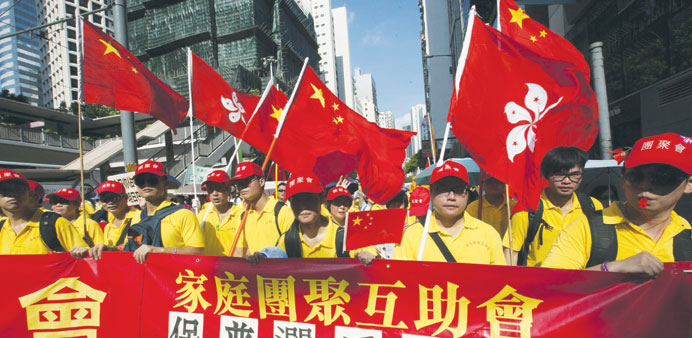AFP
Tens of thousands of people, some waving Chinese flags, marched in Hong Kong yesterday to protest against a pro-democracy campaign to blockade the business district unless Beijing grants acceptable electoral reforms.
The rally in searing summer heat came around seven weeks after rival pro-democracy protesters staged a mass march seeking a greater say in how the future leader of their city is chosen.
Paul Yip, a statistician at Hong Kong University told AFP an estimated 57,000 attended yesterday’s rally. This compared to independent estimates of the July 1 march ranging from 122,000-172,000 people.
Police said 111,800 people left yesterday’s starting point in Victoria Park, larger than their estimate of 98,600 on July 1.
Public discontent in the semi-autonomous Chinese city is at its highest for years, with concern at perceived interference by Beijing and growing divisions over how the next chief executive should be chosen in 2017 under planned political reforms.
Pro-democracy campaigners from the Occupy Central group have pledged to mobilise thousands of protesters to block roads in the Central financial district later this year if authorities reject the public’s right to nominate candidates for the post.
But the movement has been strongly criticised by Beijing and city officials as illegal, radical and potentially violent.
Organisers of yesterday’s rally, the Alliance for Peace and Democracy, say the silent majority in the city of 7mn do not support Occupy.
“We want to let the world know that we want peace, we want democracy, but please, do not threaten us, do not try to turn this place into a place of violence,” alliance co-founder Robert Chow told AFP.
Thousands, with many wearing red clothes to indicate their allegiance to Beijing, filled the park.
Some carried a banner reading ‘Long live the Chinese communist party’, while others chanted ‘We want peace and democracy!’ and ‘No violence’.
A police officer was hit by an egg after a marcher threw eggs aimed at a small group of Occupy supporters heckling yesterday’s protesters.
“I am here to oppose Occupy, as simple as that. It is a bad thing for young people,” said a 70-year-old retired chef, who only gave his surname Wong.
“I don’t know how to give a view on democracy, it’s high-level politics. I just know if there is no peace there is no prosperity,” a 40-year-old construction worker surnamed Kwok and holding a Chinese flag told AFP.
But some participants in the march, attended by several groups with ties to different Chinese provinces, were unsure why they were there.
An 18-year-old Shenzhen resident who had arrived in Hong Kong that morning said he “was not very sure” why he was taking part, and only attended because his friend had asked him to.
There were also accusations that some participants received food or other incentives and were mobilised by pro-Beijing groups in Hong Kong.
A Cable Television undercover report said some people who were bussed to the rally received a “transportation fee” of HK$200 ($25.80).
Some groups held banners representing different mainland Chinese affiliations and state-run conglomerates.
“Today you see that it (the march) is very organised, so it is clearly a result of mobilisation. We just hope that the people joined based on their own decisions,” Occupy Central co-founder Chan Kin-man told AFP.
Chow rejected such accusations, saying: “If people don’t want to take part in these activities, they don’t have to participate.”
The British colony was handed back to China in 1997 under an agreement that guarantees civil liberties including the right to protest.
Hong Kong’s leader is currently chosen by a pro-Beijing committee.
China says that all residents will be allowed to vote for the next chief executive in 2017 but that a nominating committee must choose the candidates. Democracy advocates say this means Beijing will be able to ensure a sympathetic slate of candidates and exclude opponents.
An unofficial referendum organised by Occupy activists saw the majority of 800,000 people who voted supporting reform packages that would allow public nomination.
In a counter move, an Alliance petition campaign supported by pro-Beijing groups and officials has collected some 1.4mn signatures, according to the group.

